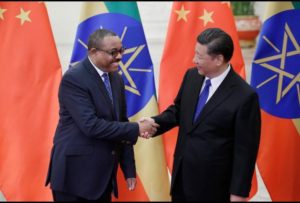- Stay Connected
China Is Africa’s Biggest Economic Partner, But What Role For The United States?

Ethiopia’s Prime Minister Hailemariam Desalegn (L) meets China’s President Xi Jinping forward of a arriving Belt and Road Forum during a Great Hall of a People in Beijing on May 12, 2017. (JASON LEE/AFP/Getty Images)
McKinsey expelled a highly approaching report in Jun with new investigate on Chinese mercantile engagement. The news debunks a series of common misconceptions in America about China in Africa, namely that Chinese actors work with a one agenda, that Chinese firms usually sinecure Chinese workers, and that China is usually meddlesome in Africa’s healthy resources. In a 8 countries studied, 90% of Chinese firms in Africa were secretly owned, 89% percent of a employees in Chinese companies were African, and trade and infrastructure beget a many poignant financial flows between China and a continent.
The McKinsey news provides a some-more picturesque perspective of China-Africa; however, what is a petrify value for American businesses and institutions meddlesome in Africa? Despite U.S. media sources and consider tanks providing a consistent tide of research on China-Africa mercantile rendezvous over a past several years, roughly nothing investigate a destiny for a United States in Africa given China’s “landing.” As Africa’s mercantile landscape continues to grow and variegate and China has turn a biggest trade partner, U.S. mercantile activity on a continent stays in a same settlement as it has for over 50 years – focused on energy, finance, and aid. The U.S. can play a extensive purpose in Africa’s expansion over a subsequent 10 years alongside and in partnership with Chinese actors, though to do so it will have to adjust to today’s Africa. The United States contingency try and scale business and tact in new sectors in Africa.
90% of U.S.-Africa trade currently is in wanton petroleum exports. In contrast, a estimate $180 billion in revenues of Chinese firms in Africa come from firms widespread opposite manufacturing, services, trade, and construction and genuine estate in near-equal shares. Opportunities everywhere for American companies to do business in these sectors as well. African countries have some-more mature markets, infrastructure, process incentives, and institutional ability than many American companies realize. Chinese shared engagements and infrastructure projects have helped to make this happen. Further, African governments are fervent to rivet American companies and to adopt business models that work, if anything to variegate offers from Chinese firms. American tactful institutions can overpass a opening by lovely shared family in African countries outward of a assist indication and by compelling new trade policies in manufacturing, trade, and infrastructure. American companies can daub into this intensity by ramping adult new business in these sectors, burst starting new engagements with African governments and operative alongside Chinese businesses and projects.
Manufacturing in sold binds extensive intensity for American companies in Africa, usually as it did for American companies during a early stages of China’s mercantile growth, and some-more recently in countries like Vietnam and Bangladesh. While over 30% of Chinese firms in Africa are in manufacturing, prolongation represents usually a tiny fragment of American businesses in Africa. Ethiopia, Rwanda, Uganda, and Senegal are building new Special Economic Zones (SEZ’s), a indication really informed to American firms outward of a continent, though a expansion they are mostly ignoring in Africa. American firms have begun sourcing textiles in Ethiopia, and earnest examples of triangular team-work have begun with Chinese firms in a country’s Hawassa Industrial Park, though not during scale. American companies can gain on these opportunities and play an successful purpose in African business by augmenting their sourcing and rendezvous in Africa’s SEZ’s.
Africa’s prolongation zone also binds transformational expansion intensity that American institutions can’t means to overlook. Despite high GDP expansion over a past decade, many of Africa’s expansion has been though pursuit creation, and 55% of Africa’s race will be civic by 2050. African countries are already grappling with shocking underemployment in their cities and this will usually feature though movement – generally given a continent’s rising girl populations. Africa needs pursuit origination not usually to exterminate misery though to forestall a exacerbation of poverty.
From 1970-2014, prolongation practice combined 260 million jobs in building countries assisting to fuel rising marketplace expansion into a benefaction duration as good as a largest and many fast rebate of misery in universe history. Manufacturing also employs a disproportionately high series of girl and women and enables significantly some-more ability send than other sectors, generally relations to a primary sector. As labor complete prolongation in core income countries is on a decrease and an estimated 85-100 million low-skilled prolongation jobs are approaching to immigrate to new markets over a subsequent decade, countless African governments and multilateral institutions such as a African Union and African Development Bank are fixation automation during a core of their mercantile agendas. It is time for American expansion bodies to actively support a automation bulletin as well.
China has landed in Africa, and a mercantile attribute with Africa’s countries will profoundly figure a destiny of a continent. But a newsworthy story for a United States is flourishing event and impetus in Africa for American businesses and organizations. African leaders are looking for partners regardless of what nation they come from to build infrastructure, deposit in industry, and sell services. Although it has been delayed to adapt, a United States can play a catalyzing purpose in African expansion by boosting a business, bilateral, and multilateral engagements in new sectors in Africa, in sold manufacturing. Opportunities everywhere for a United States in Africa with China – not notwithstanding it – though a time for U.S. rendezvous in Africa is now.
Helen Hai is CEO of a Made in Africa Initiative. Aaron Cohen is a Development Expert during a United Nations Industrial Development Organization (UNIDO).
